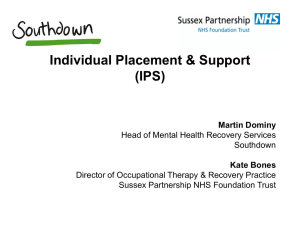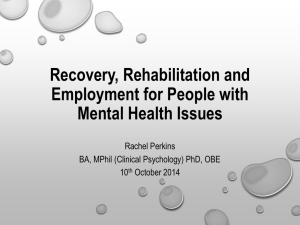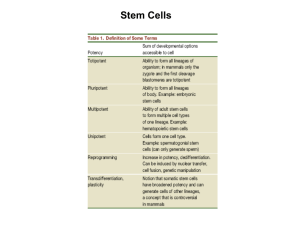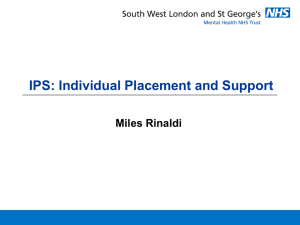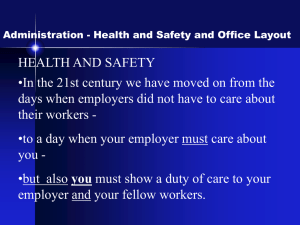Keynote-Mental-Health-and-Supported-Employment-Dr.
advertisement
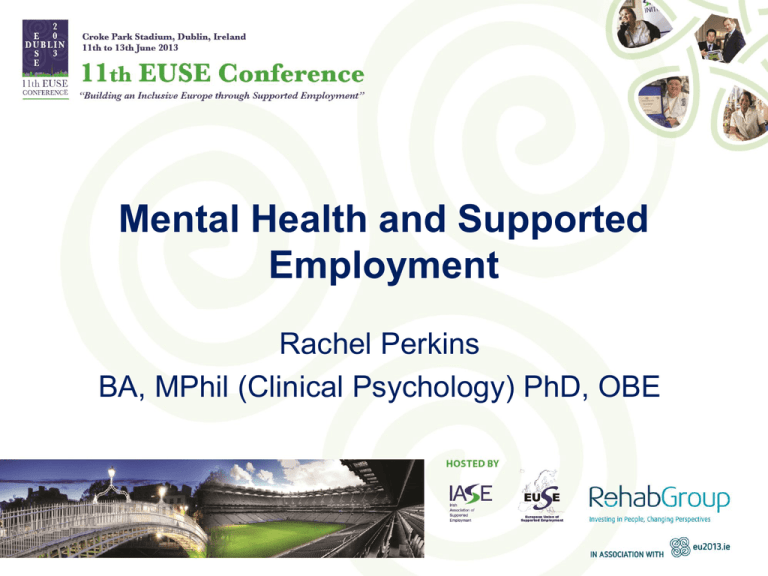
Mental Health and Supported Employment Rachel Perkins BA, MPhil (Clinical Psychology) PhD, OBE A view from 4 perspectives • 33 years working in mental health services ... from clinical psychologist to director • 28 years writing about mental health and mental health services ... and campaigning and voluntary work • 25 years being on the receiving end of mental health services (inpatient and outpatient) • 15 years in various government advisory committees/roles (including leading an independent review to Government – ‘Realising Ambitions. Better employment support for people with a mental health condition’, 2009) We know the devastating consequences of unemployment “Out of the blue your job has gone, with it any financial security you may have had. At a stroke, you have no purpose in life, and no contact with other people. You find yourself totally isolated from the rest of the world. No one telephones you. Much less writes. No-one seems to care if you’re alive or dead .” (Bird, 2001) or “... the early onset of distress will mean social exclusion throughout our adult lives, with no prospect of ...a job or hope of a futures in meaningful employment. Loneliness and loss of self-worth lead us to believe we are useless, and so we live with this sense of hopelessness, or far too often choose to end our lives.” (cited by SEU,2003) We know that work is good for mental health • It is good for our health: employment reduces mental health problems and decreases the likelihood of relapse • It links us to the communities in which we live and enables us to contribute to those communities: the opportunity to contribute is central to recovery • It provides meaning and purpose in life • It affords status and identity • It provides social contacts • It gives us the resources we need to do the other things we value in life We know that work can be central to recovery – rebuilding your life with a mental health condition • Opportunity – the chance to do the things you value and participate as an equal citizen is central to recovery • The opportunity to contribute to your community is particularly important - always being on the receiving end of everyone else’s help is a dispiriting and demoralising place to be Too often people with mental health conditions become ‘I used to be ...’ people .... Helping people to gain/regain/retain employment is critical in enabling people to become more than a ‘mental patient’, a person with a present and a future ... Employment ... a human right e.g. • Article 23 of the United Nations Declaration of Human Rights “Everyone has the right to work, to free choice of employment, to just and favourable conditions of work and to protection against unemployment.” • Article 27 of the United Nations Convention on the Rights of Disabled Persons • Article 6 and 7 of the International Covenant of Economic, Social and Cultural Rights Yet it remains a right that is denied many people with mental health conditions Most people with a mental health condition want to work – highest want to work rate of all disabled people (SEU, 2003) But in the UK • General employment rate = 71.6% • Employment rate for all disabled people = 46.9% • Employment rate for people with mental health conditions = 14.2% (Department of Work and Pensions, 2013) ‘But can they really work?’ Working with mental health conditions can be challenging. They can • affect your ability to negotiate the social world of work (rather than the physical one) – need to think about adjustments/supports to access social world of work • often fluctuate and it is difficult to know when fluctuations will occur – therefore need fluctuating adjustments and support • are not immediately obvious and types of adjustment and support people may need less well explored – therefore need to provide more support to individuals and employers to think about what sort of adjustments and support are needed But often the biggest challenges are fear and low expectations ... Fear on the part of the person, mental health professionals, employment advisers, employers • that getting a job may worsen your mental health • that you will experience prejudice and discrimination at work • that getting a job and moving off benefits may make you worse off financially ... And what happens if it does not work out that they will not be up to the job • that they will be disruptive and difficult in the workplace Low expectations Nicola Oliver (2011) a woman with bipolar disorder “My first obstacle was my employer. Ten days after I disclosed my disability I was sacked. “My second obstacle was my community psychiatric nurse. He was lovely but recommended I consider only low stress jobs and part time hours; maybe I could stack shelves in a supermarket! I hadn’t studied for three degrees to stack shelves. “My third obstacle was my psychiatrist. She told me that it was unlikely that I would ever work again.” Is it any wonder that with these messages from the ‘experts ... “My fourth obstacle became my-self. I became ‘Nicola the bipolar person’: incompetent, inadequate and worthless.” “I was offered cognitive behavioural therapy to overcome my low self-esteem, but the psychologist became my fifth obstacle. She was adamant that I should stop yearning to return to work.” Many would have given up at this point ... but Nicola was determined despite all the negative messages she continued to try to get work .... But employment support agencies were no better ... “I contacted a recruitment agent who told me I had a great CV ... but she quickly became my sixth obstacle. When I explained the gap on my CV was due to bipolar disorder I never heard from her again.” “The seventh obstacle was the charity I approached to help me get into work ... I was told ‘maybe we should wait until you are a bit better’. “My final obstacle was a disability employment advisor who was supposed to help me find work. She wanted to send me on a confidence building course! I didn’t want training, I wanted a job.” “If only ... • someone had helped me reassure my employer I was still worth employing. • they had shown conviction that I could still achieve. • I had met other employees with bipolar disorder to inspire me to believe that one day I too could return to work. What does the research tell us? Frequently we ask questions like – What makes people employment? – How can we tell if someone is ‘work ready’? – How ‘far from the labour market’ is this person? These are the wrong questions – research shows: – Diagnosis, duration, severity of problems) not reliably associated with employment outcomes – The only individual characteristics that influence employment outcomes are ‘motivation’ and ‘selfefficacy’ (very much affected by expectations of others) The most important question: ‘what is the right kind of support? The most important variable determining whether people can work is the type of support and adjustments provided The 8 principles of ‘Individual Placement with Support’ evidence based supported employment for people with mental health conditions .... 1. Focus on open employment - real jobs – and a ‘can do’ approach 2. Do not select people on the basis of ‘employability’ or ‘work readiness’ – help everyone who wants to have a go 3. Integrate employment support with treatment – treatment and employment support must be done in parallel and Employment Specialists must be part of clinical teams – sitting in the same office, working together 4. Rapid job search (start within 4 weeks) rather than stepping stones first. If training/experience are necessary, these should be in parallel with job search. 5. Job search must be personalised and based on client preferences - a person is more likely to get and keep a job that is in line with their interests/preferences - and may involve active, individualised, work with employers 6. Employers are approached with the needs of individuals in mind – not just passive applications for jobs, but pro-active job finding - an emphasis on building relationships with employers in order to access the ‘hidden labour market’. 7. Time-unlimited , personalised support to both employee and employer: Employment involves a relationship between employee and employer and both parties may need support 8. High quality assistance with in and out of work welfare benefits and financial planning Need to do all of these things to be effective – outcomes related to fidelity 16 ‘randomised controlled trials’: at least 60% of people with serious mental health problems to successfully get and keep open employment (see Bond et al, 2008, SCMH, 2009) European Randomised Controlled trials of IPS evidence based supported employment • Six European Centres: London (UK), Ulm-Guenzburg (Germany), Rimini (Italy), Zürich (Switzerland), Groningen (Netherlands), and Sofia (Bulgaria) • People included if they had schizophrenia of at least 2 years duration and were unemployed • IPS compared with existing ‘train-and-place’ vocational rehabilitation service in each site • Significantly more people receiving IPS gained employment: 55% receiving IPS vs. 28% in existing service • Significantly fewer people receiving IPS dropped out 13% receiving IPS vs. 45% in existing service • Significantly fewer people receiving IPS were admitted to hospital 20% readmitted in IPS vs. 31% in traditional service It’s not just research trials IPS is effective in regular day to day practice The experience of South West London Mental Health NHS Trust Employment Specialists in 11 Community Mental Health Teams including the Community Drug Team (2007/8): 1984 people received vocational support 1155 people successful in working/studying in mainstream integrated settings: – 645 people supported to get/keep open employment – 293 people supported to get/keep mainstream education/training – 217 people supported in mainstream voluntary work (Rinaldi and Perkins 2007) So why aren’t we doing it? • Employment not seen as a priority for health and social care services- not part of their ‘core business’ • People with mental health conditions not seen as a priority for employment services • Employment not considered a realistic goal for people with more serious mental health problems • Failure to provide the sort of support we know works • Failure to implement it properly – Investment (personal and financial in existing ways of doing things – Ignorance of the research evidence – People do not believe the research evidence IPS evidence based supported employment principles challenge some commonly held assumptions... Common assumption: people need to be fully ‘better’ before they can return to work: treatment then rehabilitation then then work The reality: You don’t have to be fully ‘better’ to work and the longer they are out of work the less likely they are to return (without special support): 6 months absence – 50% return; 12 months absence – 25% return; 2 years absence – 2% return (British Society of Rehabilitation Medicine) Common assumption: ‘stepping stones’ - people need to build up their qualifications , skills and confidence in a safe, sheltered setting they will be able to move on to open employment The reality: people learn that they can only work in a safe, sheltered setting and never move into work People need ‘water wings’ – support to keep them afloat in employment - rather than ‘stepping stones’! We need to ask ourselves: Are we really adhering to all 8 principles? For example: • Do we really have a ‘can do’ attitude? • Are employment workers really integrated into clinical teams – there at assessment and review meetings, writing in the same notes ...? • Are we still ‘selecting’ who we help on the basis of our judgements about ‘employability’? • How good are we at ‘job-finding’? Do we really know our local employers? How good are we at supporting them? • How can we really providing access to time-unlimited e ongoing support? What sort of support within the 8 principles? • Help with all the things around work (like getting up, getting to work etc.) • Help to sort out problems outside work that may jeopardise the person’s ability to work • Help when the person or their employer needs it ... Help needs to be there when problems occur (not having to wait for appointments): the role of telephone support • Peer support – often people who have faced similar challenges are the best ones to provide support AND seeing what others have achieved can increase motivation and self-confidence. For example: – employing people with lived experience as Employment Specialists – sharing experience through sharing stories, – peer mentoring – peer led support groups • Time limited ‘work experience’ or ‘internships’ in parallel with job search and in real employment settings. Can increase the confidence of the individual and show employer that people can work effectively • Managing symptoms and problems in a work context – a work health and well-being plan “Having your own plan about how to cope and what you need is good for employer and employee.” (see ‘Surviving and Thriving at Work, Disability Rights UK sarah.cosby@disabilityrightsUK.org) • Matching the job and the person • Starting work gradually and building up hours over time • Starting small and building up - most people start their working lives in ‘marginal’ jobs (delivering newspapers, seasonal work etc.) ... but then move on in their careers • Not just ‘9 to 5’ . – working from home – working part time (maybe only a few hours/days per week) – self-employment • Adjustments in the workplace And remember that: • ‘Job retention’ is as important as getting a job ... and does not always mean staying in the same job • Not just jobs but careers ... the importance of mentoring in relation to career development (see RADIATE in UK as an example of peer mentoring) But most of all we must raise our expectations “The greater danger for most of us lies not in setting our aim too high and falling short, but in setting our aim too low and achieving our mark.” “... grant that I may always desire more than I can accomplish.” Michelangelo (1475-1564) “There’s a better life out there ... If you just sit back, then you won’t make it – but you can make it if you want to. You’ve got to be real with yourself. The power is you.” (Nash Momori, 2008) It may not be easy but it really is worth it! “I have re-entered full-time employment. Over a year later I am still working. I now focus more on opportunities in life and less on my condition. I regularly socialise with my colleagues after work and actually feel content to be a taxpayer again … The support has been immeasurably important …[it] has enabled me to make the journey towards recovery and realise my aim of contributing to society again through fulfilling employment.” “My passion for my career is immense. A job defines you, provides money, personal fulfilment and a sense of achievement. This is what I am, this is what I do, I am no longer a mental health condition.” “Now I’m a contributing member of society because of my employment. It’s worth is altering the life of someone with a mental illness … helping me to change direction from hopelessness to being worthwhile.”

